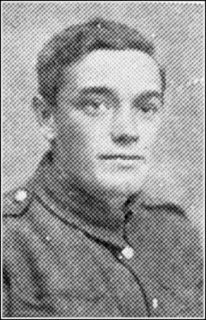 |
| Pte. Ben Beaumont |
Contact details
There seems to be a continuing issue with the 'Comment' feature on the site, so if you do wish to get in touch, you can always make contact via e-mail to greatwarworkshops@gmail.com
Sunday 30 September 2018
Tuesday 1st October 1918
Saturday 29 September 2018
Monday 30th September 1918
Cpl. William Frederick Ackrill (see 10th September), serving in France with 2DWR, suffered an accidental injury to his left knee; he would be admitted via 12th Field Ambulance to 23rd Casualty Clearing Station.
Pte. George Albert Wright (see 30th July), serving with 148th Labour Company Labour Corps, departed for England on two weeks’ leave.
A.M. James Linfoot (see 11th May), serving in England with the RAF, was promoted Air Mechanic, Class 2.
A payment of £12 10s. 1d. was authorised, being the amount due in pay and allowances to the late Pte. Jacob Osborne (see 24th May), who had died of wounds in May; the payment would go to his father, Edward Jacob.
Friday 28 September 2018
Sunday 29th September 1918
 |
Capt. Dick Bolton MC
Image by kind permission of Henry Bolton
|
Ptes. John Blackburn
(see 20th September), Arthur Clarke (see 13th May 1917) and Edwin Wright (see 4th
April) departed on two weeks’ leave to England.
 |
| Pte. Arthur Lindsay |
Thursday 27 September 2018
Saturday 28th September 1918
 |
Capt. Bob Perks DSO
Image by kind permission of Janet Hudson
|
Wednesday 26 September 2018
Friday 27th September 1918
Pte. Fred Clayton (see 5th September) was reported by Sgt. Willie Nichols (see 16th November 1917) as being ‘dirty on 2pm parade’; on the orders of 2Lt. Sam Benjamin Farrant (see 4th August) he was to be confined to barracks for three days.
Pte. Claude Wilfred Norman (see 9th August) re-joined the Battalion from 23rd Division Rest Station.
Pte. William Henry Jones (see 30th December 1916), serving with the Labour Corps, was formally discharged from the Army ‘sick’, suffering from ‘chronic sycosis’ (facial inflammation); he was awarded the Silver War Badge and an Army pension of 7s. 6d. per week.
 |
| Pte. Albert Christopher Benson |
 |
| 2Lt. Harley Bentham |
Tuesday 25 September 2018
Thursday 26th September 1918
Monday 24 September 2018
Wednesday 25th September 1918
Cpl. Harry Wood (see 14th September) was transferred to England from 57th General Hospital in Marseilles; he would travel onboard no.36 Ambulance Train and, on arrival, would be admitted to 2nd Western General Hospital in Manchester.
Sunday 23 September 2018
Tuesday 24th September 1918
 |
| Capt. Bob Perks DSO |
 |
| Lt. Col. Robert Raymer |
 |
Lt. George Stuart Hulburd
Image by kind permission of Paddy Ireland
|
Saturday 22 September 2018
Monday 23rd September 1918
Cpl. Arthur Edward Hunt (see 12th May), serving in France with 266th Area Employment Company, departed for England on two weeks’ leave.
L.Cpl. Robert William Buckingham (see 16th July), serving at the Regimental Depot at Halifax, was late reported for ‘Neglect of duty, ie when on escort duty not returning to barracks on completion of duty’; he would be ordered to be reduced to the rank of Private.
Friday 21 September 2018
Sunday 22nd September 1918
 |
Maj. James Christopher Bull MC
Image by kind permission of the Trustees of the DWR Museum
|
Thursday 20 September 2018
Saturday 21st September 1918
CQMS Maurice Harcourt Denham (see 15th September), who had been discharged to the Convalescent Depot at Lido d’Albano a week previously, was re-admitted 38th Stationary Hospital in Genoa; he was now suffering from influenza.
 |
CQMS Maurice Harcourt Denham
Image by kind permission of Henry Bolton
|
Wednesday 19 September 2018
Friday 20th September 1918
 |
Sgt. John William Wardman DCM, MM
Image by kind permission of Paul Bishop
|
Pte. William Clarence Mitchell (see 20th September 1917) was formally discharged from the Army as no longer physically fit for service; this was the first anniversary of his having been wounded. He was assessed as having suffered a 60% disability and was awarded a pension of £1 4s. per week.
 |
| Pte. Alfred Spencer |
The remarkable way in which boys from our farms have made good in this war is once more exemplified by the winning of a Military Medal by Private Thomas Procter (see 5th July 1916), Machine Gun Corps, nephew of Mr. Thomas Askew, of Demesne Farm, Newsholme, for whom he worked at the time of enlisting. The official report of Private Procter’s achievement is as follows: “At ………. between the 20th and 29th July 1918. For conspicuous gallantry and devotion to duty during operations on the ……………., when his gun team had suffered heavy casualties. This soldier repeatedly fetched ammunition under intense shell fire and this enabled his gun team to remain active at a critical period. Private Procter’s pluck and cool determination heartened his comrades under trying circumstances. Throughout the operations his conduct was worthy of high praise”. The congratulations of all the neighbourhood will go out to Private Procter and his relatives.
 |
| Pte. William Smith |
 |
| Pte. John Myles Raw |
Tuesday 18 September 2018
Thursday 19th September 1918
Ptes. Robert Callaghan (see 5th February 1916) and Michael Cooney MM (see 16th August 1917) were tried by Field General Court Martial on charges of being absent without leave (details unknown); both were found guilty and were sentenced, respectively, to 35 days and 42 days Field Punishment No.1.


